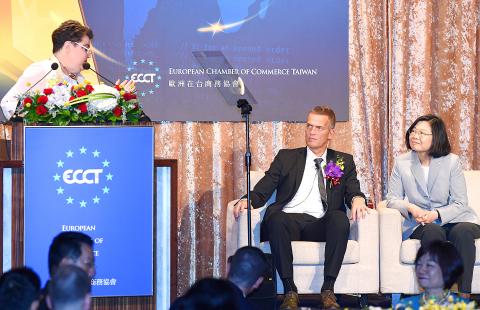The European Chamber of Commerce Taiwan (ECCT) on Thursday called for less hurdles for foreigners wanting live and work in Taiwan to solve its shortage of skilled labor.
“The government should make it easier for foreigners to live and work in Taiwan,” ECCT chairman Hakan Cervell told an audience that included President Tsai Ing-wen (蔡英文), senior government officials and executives from European and Taiwanese companies.
The foreign trade group, which has US$45 billion in direct foreign investments, lauded the labor law revision early this year and said the passage of the Act Governing Recruitment and Employment of Foreign Professionals (外國專業人才延攬及雇用法) was a good first step.

Photo: Liao Chen-huei, Taipei Times
However, further efforts are needed to make Taiwan business-friendly and attractive to foreign talent, it said.
Existing rules mean foreign nationals are treated unequally to Taiwanese residents, with different number formats for Taiwanese identity cards and Alien Resident Certificates, Cervell said.
The practice denies foreign resident card holders access to many services, as more services go online, he said.
Other examples of unequal treatment include foreign residents not being eligible for electric vehicle subsidies or senior citizen discounts on the High-Speed Rail service, he said.
The government could also resolve the shortage of skilled labor by introducing short-term business visas and allowing more foreign workers in the service sector.
The ECCT said it welcomes Taiwan’s effort to speed up the development of the “green” energy industry, but added that many obstacles need to be overcome if the nation wants renewable energy sources to supply 20 percent of electricity by 2025.
Challenges include constructing supporting infrastructure such as electricity grids and harbors, streamlining the permitting process, and resolving financial issues in line with international trends and standards, the chamber said.
“European companies in the wind energy industry are committed to developing Taiwan into a regional manufacturing and support hub for wind energy in Asia. However, it will take time to develop local competence and expertise,” Cervell said.
The ECCT said it supports the creation of smart cities, but the right infrastructure must first be put in place, such as 5G telecommunications, electric vehicle charging stations and smart grids, Cervell said, adding that the regulatory environment must be flexible enough to allow technological innovation and new business models.
The ECCT supports making English the second official language of Taiwan, as English is the global language of business, diplomacy and international organizations.
“Making English an official language would make Taiwan more attractive to international investors and give Taiwan more access to the world,” Cervell said.

The US dollar was trading at NT$29.7 at 10am today on the Taipei Foreign Exchange, as the New Taiwan dollar gained NT$1.364 from the previous close last week. The NT dollar continued to rise today, after surging 3.07 percent on Friday. After opening at NT$30.91, the NT dollar gained more than NT$1 in just 15 minutes, briefly passing the NT$30 mark. Before the US Department of the Treasury's semi-annual currency report came out, expectations that the NT dollar would keep rising were already building. The NT dollar on Friday closed at NT$31.064, up by NT$0.953 — a 3.07 percent single-day gain. Today,

‘SHORT TERM’: The local currency would likely remain strong in the near term, driven by anticipated US trade pressure, capital inflows and expectations of a US Fed rate cut The US dollar is expected to fall below NT$30 in the near term, as traders anticipate increased pressure from Washington for Taiwan to allow the New Taiwan dollar to appreciate, Cathay United Bank (國泰世華銀行) chief economist Lin Chi-chao (林啟超) said. Following a sharp drop in the greenback against the NT dollar on Friday, Lin told the Central News Agency that the local currency is likely to remain strong in the short term, driven in part by market psychology surrounding anticipated US policy pressure. On Friday, the US dollar fell NT$0.953, or 3.07 percent, closing at NT$31.064 — its lowest level since Jan.

The New Taiwan dollar and Taiwanese stocks surged on signs that trade tensions between the world’s top two economies might start easing and as US tech earnings boosted the outlook of the nation’s semiconductor exports. The NT dollar strengthened as much as 3.8 percent versus the US dollar to 30.815, the biggest intraday gain since January 2011, closing at NT$31.064. The benchmark TAIEX jumped 2.73 percent to outperform the region’s equity gauges. Outlook for global trade improved after China said it is assessing possible trade talks with the US, providing a boost for the nation’s currency and shares. As the NT dollar

The Financial Supervisory Commission (FSC) yesterday met with some of the nation’s largest insurance companies as a skyrocketing New Taiwan dollar piles pressure on their hundreds of billions of dollars in US bond investments. The commission has asked some life insurance firms, among the biggest Asian holders of US debt, to discuss how the rapidly strengthening NT dollar has impacted their operations, people familiar with the matter said. The meeting took place as the NT dollar jumped as much as 5 percent yesterday, its biggest intraday gain in more than three decades. The local currency surged as exporters rushed to